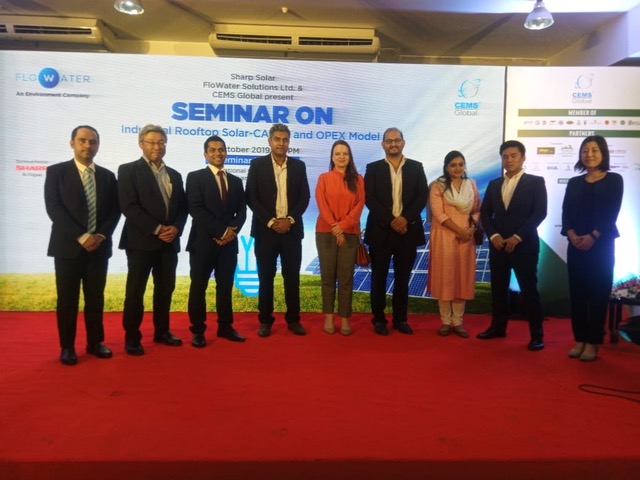The leasing model of rooftop solar could hold the key to new commercial and industrial capacity in Bangladesh.
The introduction of net metering and availability of low-cost solar funding has piqued the interest of industrial concerns keen to consume cheap electricity generated on-site.
Solar leasing is proving an attractive option for industrial clients, according to project developers who attended the 17th Solar Bangladesh Expo in Dhaka, as business owners do not have to offer guarantees to secure project funding.
The state-owned Infrastructure Development Company Ltd provides 80% of solar rooftop funding at a ‘soft loan’ interest rate of 6% and by offering roofspace, industrial clients can benefit from electricity cheaper than that provided by public utilities.
New company
The three-day trade show in the Bangladeshi capital, which closed on Saturday, saw the launch of industrial solar rooftop company FloSolar Solutions Ltd.
Director Ahmed Imtiaz told pv magazine his company is in talks with a large steel manufacturer to set up a rooftop solar system. “Until now, the interest [has been] high [in the] opex [operational expenditure, or leasing] model,” he said. “Several industrial units have shown interest.”
Popular content
In a press statement, FloSolar managing director Mustafa A K Khan said the company aims to build a 300 MWp industrial solar rooftop portfolio with bankable electricity off-takers, public and private. “The engineering procurement construction will be done by our global partners, like Sharp Solar Solution Asia Ltd, with local engineering support from FloSolar,” said the MD.
Leasing popularity
Nahid Hasan, general manager of Dhaka-based solar developer Exelon Bangladesh Ltd, also told pv magazine industrialists prefer the leasing model to the expenditure of funding their own rooftop systems. Exelon is in talks about setting up two leased rooftop systems outside the capital, said Hasan.
The popularity of leasing has been boosted by the availability of net metering, according to Munawar Moin, managing director of Dhaka-based PV installer Rahimafrooz Renewable Energy Ltd. Moin told pv magazine industrial clients would only fund their own solar systems if cheap financing was available and there was wider standardization of compliance and certification.
Bangladesh’s Sustainable and Renewable Energy Development Authority (SREDA) would also have to introduce installation training and ensure quality, efficiency and long-term performance, added the Rahimafrooz MD. “Along with escalation [of funding], localization of solar module [manufacturing], and BOS [balance of system component manufacturing] is also essential for long term sustainability and competitiveness,” said Moin, who is also president of the Solar Module Manufacturers’ Association of Bangladesh.
SREDA member Siddique Zobair told pv magazine, although solar leasing is more popular with industrial clients at present, installing their own solar rooftops could also be profitable if they can ensure maximum efficiency from their projects.
This content is protected by copyright and may not be reused. If you want to cooperate with us and would like to reuse some of our content, please contact: editors@pv-magazine.com.


6 comments
By submitting this form you agree to pv magazine using your data for the purposes of publishing your comment.
Your personal data will only be disclosed or otherwise transmitted to third parties for the purposes of spam filtering or if this is necessary for technical maintenance of the website. Any other transfer to third parties will not take place unless this is justified on the basis of applicable data protection regulations or if pv magazine is legally obliged to do so.
You may revoke this consent at any time with effect for the future, in which case your personal data will be deleted immediately. Otherwise, your data will be deleted if pv magazine has processed your request or the purpose of data storage is fulfilled.
Further information on data privacy can be found in our Data Protection Policy.